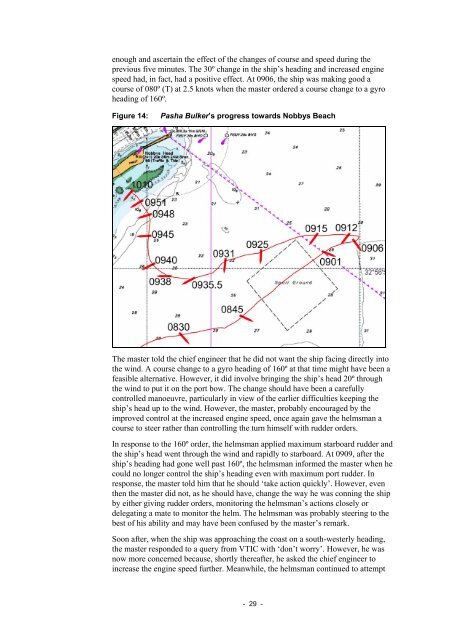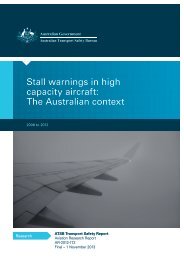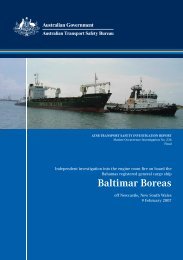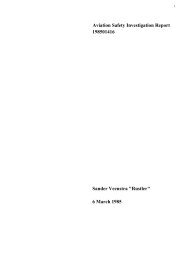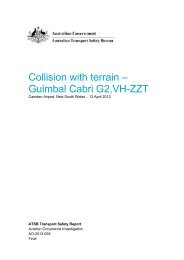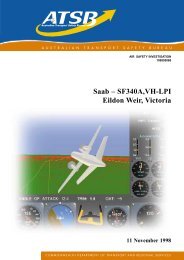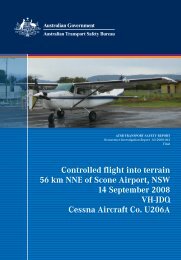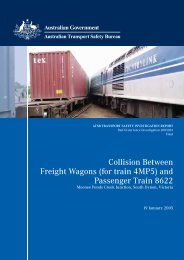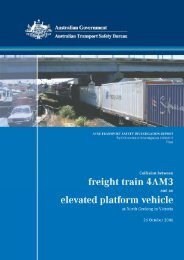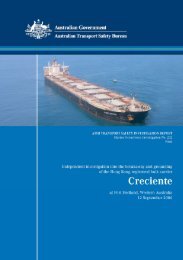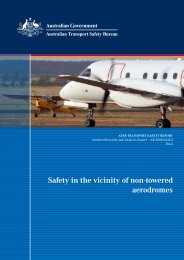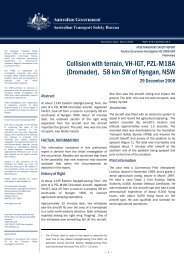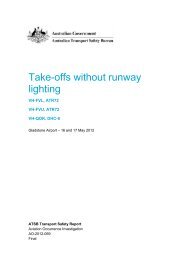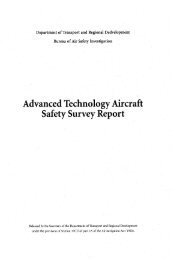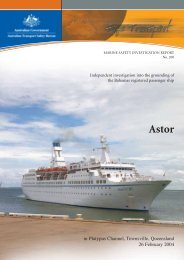Pasha Bulker 243 - Independent investigation into the grounding of ...
Pasha Bulker 243 - Independent investigation into the grounding of ...
Pasha Bulker 243 - Independent investigation into the grounding of ...
You also want an ePaper? Increase the reach of your titles
YUMPU automatically turns print PDFs into web optimized ePapers that Google loves.
enough and ascertain <strong>the</strong> effect <strong>of</strong> <strong>the</strong> changes <strong>of</strong> course and speed during <strong>the</strong><br />
previous five minutes. The 30º change in <strong>the</strong> ship’s heading and increased engine<br />
speed had, in fact, had a positive effect. At 0906, <strong>the</strong> ship was making good a<br />
course <strong>of</strong> 080º (T) at 2.5 knots when <strong>the</strong> master ordered a course change to a gyro<br />
heading <strong>of</strong> 160º.<br />
Figure 14:<br />
<strong>Pasha</strong> <strong>Bulker</strong>’s progress towards Nobbys Beach<br />
The master told <strong>the</strong> chief engineer that he did not want <strong>the</strong> ship facing directly <strong>into</strong><br />
<strong>the</strong> wind. A course change to a gyro heading <strong>of</strong> 160º at that time might have been a<br />
feasible alternative. However, it did involve bringing <strong>the</strong> ship’s head 20º through<br />
<strong>the</strong> wind to put it on <strong>the</strong> port bow. The change should have been a carefully<br />
controlled manoeuvre, particularly in view <strong>of</strong> <strong>the</strong> earlier difficulties keeping <strong>the</strong><br />
ship’s head up to <strong>the</strong> wind. However, <strong>the</strong> master, probably encouraged by <strong>the</strong><br />
improved control at <strong>the</strong> increased engine speed, once again gave <strong>the</strong> helmsman a<br />
course to steer ra<strong>the</strong>r than controlling <strong>the</strong> turn himself with rudder orders.<br />
In response to <strong>the</strong> 160º order, <strong>the</strong> helmsman applied maximum starboard rudder and<br />
<strong>the</strong> ship’s head went through <strong>the</strong> wind and rapidly to starboard. At 0909, after <strong>the</strong><br />
ship’s heading had gone well past 160º, <strong>the</strong> helmsman informed <strong>the</strong> master when he<br />
could no longer control <strong>the</strong> ship’s heading even with maximum port rudder. In<br />
response, <strong>the</strong> master told him that he should ‘take action quickly’. However, even<br />
<strong>the</strong>n <strong>the</strong> master did not, as he should have, change <strong>the</strong> way he was conning <strong>the</strong> ship<br />
by ei<strong>the</strong>r giving rudder orders, monitoring <strong>the</strong> helmsman’s actions closely or<br />
delegating a mate to monitor <strong>the</strong> helm. The helmsman was probably steering to <strong>the</strong><br />
best <strong>of</strong> his ability and may have been confused by <strong>the</strong> master’s remark.<br />
Soon after, when <strong>the</strong> ship was approaching <strong>the</strong> coast on a south-westerly heading,<br />
<strong>the</strong> master responded to a query from VTIC with ‘don’t worry’. However, he was<br />
now more concerned because, shortly <strong>the</strong>reafter, he asked <strong>the</strong> chief engineer to<br />
increase <strong>the</strong> engine speed fur<strong>the</strong>r. Meanwhile, <strong>the</strong> helmsman continued to attempt<br />
- 29 -


